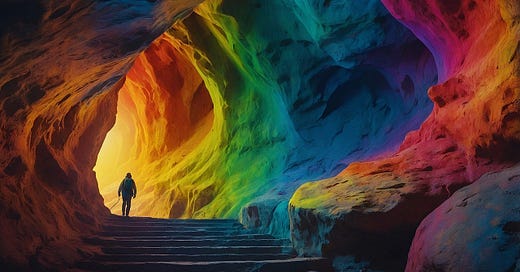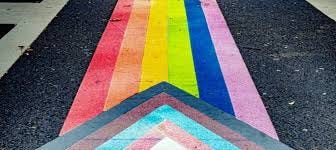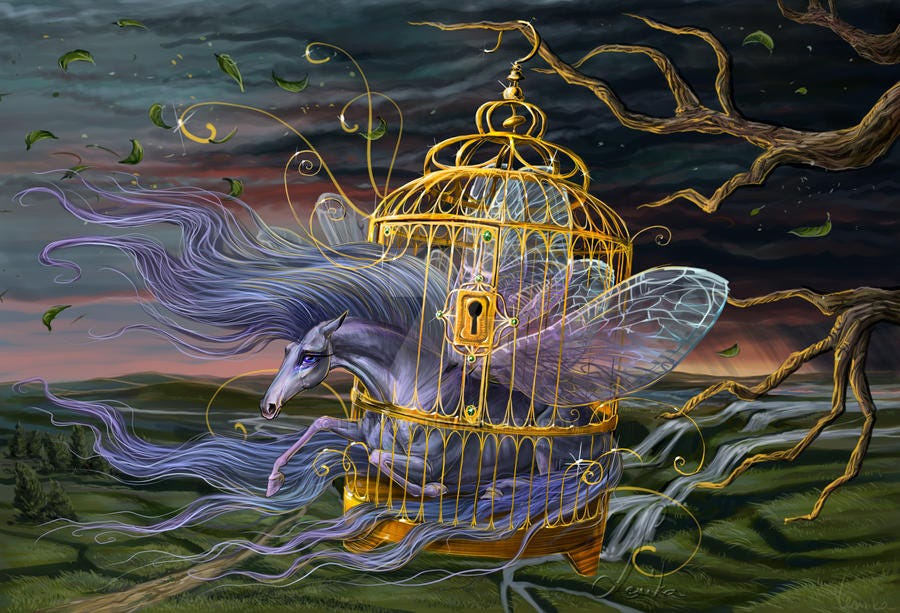“OK So I am straight, I am cis, and I am allo; but somehow I am also sort of drawn to queerness, or I don’t know, like I kinda resonate with it? But I have taken the time and examined my attractions and my relationship to gender and “allo, straight, and cis” are what I get every time so like…what do I do with that?
This is something I have started hearing more and more often; especially after my brother and I give our presentation on eucontamination and include the section about how Paul has been blessed to be eucontaminated by queerness even as he is still straight, cis, and allo1. Most recently I had two separate people (Josh Patterson of the (Re)Thinking Faith Podcast2 among them) ask me variations of it within the space of a weekend. Frequently this question is attended by a (genuinely virtuous) concern to not appropriate queerness. I don’t get the question from people who don’t care about queer folx; I get it from people who care very much. If you are queer you have likely encountered a similar sentiment from allies who reach out and (often awkwardly) ask questions about the A in LGBTQIA+ (it stands for Asexual/Aromantic—no, “ally” is not a queer identity, yes it is appropriation to act as though it is no matter how well intentioned). There is this awareness that queerness is beautiful; there is something like an attraction to queerness as such but a feeling or concern that queerness is also unavailable to them.
This essay is a response to that dynamic; one that I hope straight, cis, allo people will find encouraging.
On Power and Social Categories
Straight-ness, Cis-ness, and Allo-ness exist as oppositional exclusions. That is to say that while it is true that straight means a person who is attracted exclusively to people who occupy the other end of the gender spectrum, cisgender means a person whose gender aligns with the sex they were assigned at birth, and allosexual means people who experience sexual desire at levels roughly equivalent to or higher than the statistical average, it is also true at the same time that straight means “not gay”, cisgender means “not transgender” and allosexual means “not on the asexual spectrum”. The former set of definitions—let’s call them Primary Straightness, Cisness, and Allosexualty—are positive (they say what the category means); the latter set of definitions—Secondary Straightness etc…—are negative definitions (they define the category based on what it is not). And the fact of the matter is that the negative definitions are controlling; they are what really count, what shape our social, political, and religious understanding when we think about what or who a person is.
Each of these categories (straight, cis, and allo) also designate the socially (and politically, and legally) privileged positions relative to their queer counterparts (gay/lesbian/bi/pan, trans/non-binary/genderqueer, and asexual/aromantic spectrum), and the self-destructive twist of occupying a privileged social category is that the category itself becomes a cage. We already know (if we have been paying attention) that whiteness as a social category was invented by the people who came to call themselves white as a way to distinguish themselves from the the (black and indigenous) people of the world as people who could not be enslaved and colonized3. Blackness was invented by people who wanted to enslave others without being at risk of enslavement as a category to designate the sort of people who could be enslaved. As a result people who imagine/understand ourselves to be white must4 embrace anti-racism both as a matter of basic justice and as the only way to liberate ourselves from the destructive thrall of unjust and unearned social privilege. As James Baldwin put it to his nephew5:
You have, and many of us have, defeated this intention and by a terrible law, a terrible paradox, those innocents who believed that your imprisonment made them safe are losing their grasp of reality. But these men are your brothers, your lost younger brothers, and if the word "integration" means anything, this is what it means, that we with love shall force our brothers to see themselves as they are, to cease fleeing from reality and begin to change it, for this is your home, my friend.
In a similar (not identical) way, queerness is a category which designates people who can be discriminated against on the basis of our sex, our gender, or our sexuality, and our straight, cis, allo sisters and brothers will not themselves be free until they learn “to see themselves as they are, to cease fleeing from reality and begin to change it”.
Thus when a person says “I am straight” their words hold a sort of double meaning. They mean both that they are attracted exclusively to people on the opposite side of the gender binary6 and they mean that the speaker is not lesbian, gay, bisexual, or pansexual. I suspect that the tension my cis-het-allo friends feel and the resonance with queerness that my friends experience towards queerness lies predominantly in the second of the double meanings (the secondary but more controlling meaning) these privileged categories represent. Because cis-het-allo-ness (I am going to shorthand those as just Straightness for the rest of this essay) are hegemonic and exist primarily in opposition to and exclusion of queerness—and because to be Straight as a political (and thus Secondary) identity is nothing more than to be not queer—Straightness is itself a prison. Golden handcuffs are handcuffs nonetheless. When my brother Paul talks about finding freedom by accepting the eucontamination of Queerness into his life and relationships he is talking (among other things) about finding freedom from this Secondary Straightness.
Philosophers and theorists have been talking about this dynamic for a long time now. We talk about deconstructing Straightness: taking it apart to see how it ticks and then deciding what bits we want and which were hurting us as an act of empowerment—taking control of concepts which would otherwise control us. The whole idea of queering something is to “make it odd”, to de-center or denaturalize it. It is to strip away from it the privilege of being unquestioned. default, normal and to put it in its place as nothing more or less than one option among many legitimate options.
Until straight people queer their straightness they are bound under the control of their Secondary Straightness and its demands. Second Straightness tells men that there are increasingly fewer and fewer way to be a man, to be straight, to be sexual. It tells men that if they paint their nails, cry at movies, co-parent with their spouses, embrace non-violence, stand in solidarity with the oppressed, or just want to feel pretty, that they are not real men. It tells women that if they do not submit to men, do not performs femininity just right, do not have children, or otherwise conform to some patriarchal expectation that they are not real women. Of late it has become increasingly apparent that Second Straightness as a force in our society is working hard to box out any expression of masculinity that is not sufficiently conformist and toxic. How many ways are there to be a man? Does crying at musicals make a man queer? What about quiet integrity? If you aren’t screaming at feminists and insulting trans people on the internet can you really call yourself a man anymore?
You see that is the great and terrible truth of Second Straightness: it is forever constricting and shifting. Second Straightness is nothing but what the many ever-shifting powers and influences in contemporary society happen to think it means to be not queer; and as the scope of not queerness shrinks, more and more straight, cis, and allosexual men and women are finding that they are no longer Secondly Straight. We have seen increasing reports of butch cis women being harassed out of public bathrooms because some more normatively (Secondly Cis) woman has decided that she must be trans. Gentleness, tenderness, quiet strength, and dignity are now “on the bubble” as insufficiently Secondly Straight. This is a game wherein the only way to win is to refuse to play.
Straight Friends, it is Time to Queer Yourselves!
There is good news. But let me start with some clarity because this isn’t a point on which I am willing to risk being misunderstood: If you are not queer then you are not queer. If you are a straight, cis, allosexual person whose experience isn’t described by any of the letters of the queer acronym then you are not queer and it would be wrong for you to describe yourself as queer. It would be an act of appropriation; it would decrease our community’s ability to organize against the social, legal, historical, religious, and political forces which have collaborated in our marginalization. To claim a queer identity when you are not queer is an act of political violence against the queer community. That needs to be stated clearly and unambiguously.
And…
To claim a queer identity when you are not queer is an act of political violence against the queer community.
And yet you can, you should, queer your identity. To queer something is to denaturalize and decenter it. To queer something is to relieve it of the burden of being normative, of being the default; it is to free it from the impossible weight of hegemonic power over all the other options and ways of being in the world. To queer your straightness as a straight person is to work towards seeing yourself and your straightness not as normal or default or natural, but as one neat way that people just happen to be. A straight person who has never queered their straightness lives under the thumb of society’s Secondary Straightness and all of the restrictions and forced definitions that that entails. A straight person who is working to queer themselves is fighting against—living in opposition to—Secondary Straightness and thereby queering their Primary straightness so that it is reduced from their master—telling them what they have to be—to a helpful tool describing the pattern of their attractions.
This is one of the primary reasons that queer liberation is a blessing not only to queer people but to everyone. The devious secret that Hegemonic power hides from those who “benefit” from it is that they too are bound by it; they too are limited. Of course queer liberation benefits queer people, but just because the privilege of being seen—being treated—as people in the hegemonic normative category is something that can be revoked, privilege will always limit the expression and the options of those who are not willing to fall into the kenosis of privilege. What society gives, society can take away, and so long as holding on to that “gift” is important to you, it must also control you.
What society gives, society can take away
In the Christian tradition we are told that we have to die to the self in order to live. It is no surprise to me that queerness—another of God’s blessings to a world in bondage—offers the same way of escape. “Take up your cross as follow me” says Jesus and for our straight sisters and brothers one beam of that cross is the abandonment of their place as normative, natural, default, and good. Straightness—Primary Straightness—is not any worse than queerness, but neither is it any better. It simply is. In contrast, Secondary Queerness is fundamentally superior to Secondary Straightness just because the two are opposed with Secondary Queerness on the side of liberation while Secondary Straightness serves the interests of unjust hierarchy and oppression.
In the end the choice, as it so often does, comes down to living safely or pursuing Life, Liberation, and Joy. The price of Life is power and safety. As C.S. Lewis remarked7:
To love at all is to be vulnerable. Love anything and your heart will be wrung and possibly broken. If you want to make sure of keeping it intact you must give it to no one, not even an animal. Wrap it carefully round with hobbies and little luxuries; avoid all entanglements. Lock it up safe in the casket or coffin of your selfishness. But in that casket, safe, dark, motionless, airless, it will change. It will not be broken; it will become unbreakable, impenetrable, irredeemable. To love is to be vulnerable.
And there is so much joy and so much life on this side of that “death”! If you have made it this far, pause for a moment to let yourself dream about a life where you are able to experience your attractions without any concern for what they mean about you, to express your gender in whatever way you like or to ignore gender altogether without a care in the world for whether you are acting like a woman or a man, to let the intensity of your desires for sex and romance to simply be without the weight of that having to mean something for your suitability as a potential or actual partner. Breathe it in, feel the rush of longing and let it wash over you. That is a glimpse of Joy, of a better, queerer, world that beckons from the other side of the death of your Secondary Straightness—your need to be straight, to hold on to that suffocating privilege.
Breathe it in, feel the rush of longing and let it wash over you. That is a glimpse of Joy
The process is often terrifying; it can be excruciating. There is a reason that I chose death as the metaphor for queering yourself. For those of us who have made the leap, it is like religious deconstruction and, as my friend Tim says, deconstruction is not a map, its an explosion; it doesn’t lead to one outcome and there is no way to begin with an end in mind. The journey of queering yourself will be unique to you. Your adventure may be like Bilbo’s: leading you back, in the end, to the place you started but forever changed, liberated of the need to be straight and thereby blessed with the joy of unfettered straightness. But then again it may not be like that at all. Once you let go of your need to be straight you may find that you never were straight to begin with. You may stumble across something that shatters your egg. You may stumble into a definition of an identity that fits in a way nothing ever has and sings in harmony with your heart song. You may encounter the masterdoc and discover that you were a lesbian all along. Maybe you will discover a freedom and joy in drag that you never dreamed of. Or maybe something completely different. But you can’t decide what it will be ahead of time; you have to be willing to find out.
You cannot become queer my cis, het, allo friends—not unless you are—but you can queer your cis-ness, your heterosexuality, and your allosexuality and in that you will find life and liberation in solidarity with oppressed.
So here it is, here is the framing for all of you who embark on this journey and find themselves still straight, cis, and allosexual at the end: I am straight/allo/cis but I am working to queer my straightness. I hope you will try it out.
allo (allosexual) will be defined a little later on in this essay
I am mentioning Josh with his permission here. Also you can listen to a great conversation he had and published with Keegan Osinski wherein he publicly reflects on the same theme in this recent episode of his podcast.
For a full and compelling background on this I recommend Nell Irvin Painter’s The History of White People and Isabel Wilkerson’s Caste: The Origins of Our Discontents
This is a moral imperative
From A Letter to My Nephew which absolutely everyone ought to not just read but probably ought to memorize.
Non-binary people absolutely problematize straightness in delightful ways. For instance, while it is uncomplicated and unproblematic for someone to identify as a lesbian on the basis of being attracted to people on the femme side of the gender spectrum; straight identifying men will often find femme and androgynous non-binary people confounding the category of straightness. Cheers non-binary friends!






